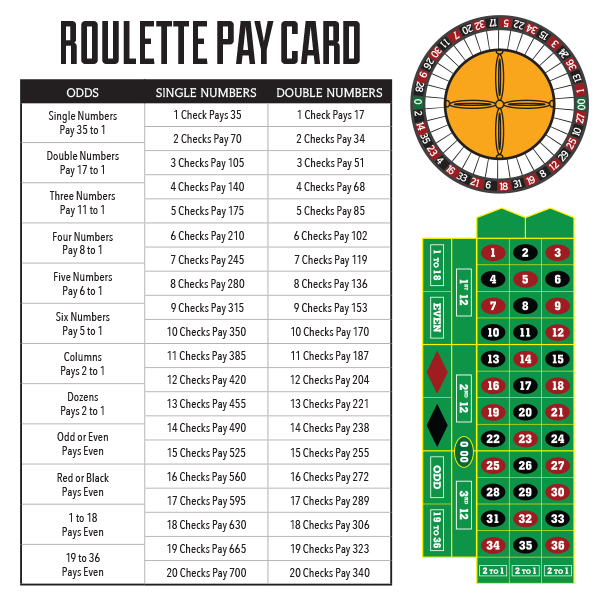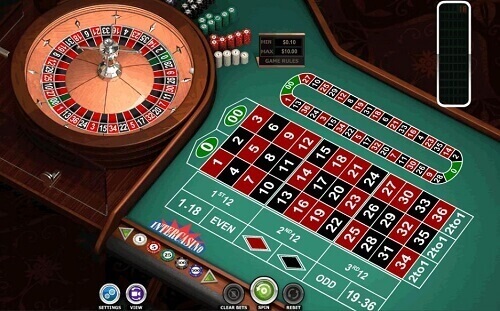Roulette Odds 8 Black In A Row
What are the roulette odds of the ball landing in the same colour ten times in a row? What about landing on the same number twice? Let´s take a look, and then we´ll explain how this relates to the Gambler´s Fallacy, or the Monte Carlo Fallacy- the belief that the odds of a black number coming in increase, the more times you see red.
Let´s look at a European Roulette wheel. Over a single spin, the odds of a red number coming up are 18/37, or 1 in 2.06. Over 2 spins, the odds of 2 reds coming in are 1 in 2.06×2.06, or 4.24.
The odds of seeing 10 reds in succession are 1 in (2.06) to the power of 10 = 1 in 1376.
Virgin Live Roulette
8 Black = 1/37 (there is only one 8 Black number) Red and Odd = 9/37 (there are 9 numbers that are both red and odd) Dozen and Column = 4/37 (there are only 4 numbers in the same dozen and column) As well as working out the probability of winning on each spin. In most of the casino games, the numbers are very much random, which makes it very unique and unpredictable what to guess. I have tried to find many different types of ways to crack the code of the spinning wheel.
See How Many Reds you Can Get in a Row on Virgin Live Roulette
Play 10.00, Get 10.00 Bonus + 30 Spins
T´s & C´s
New members only, must opt in. Min £10 deposit & wager. 30 day expiry from deposit.18+. Free Spins: on Double Bubble. 1p coin size, max lines. Bingo: Advertised ticket value based on £1 tickets. Game availability & restrictions apply. £10 Bonus: register by 01/12/2020 and deposit within 3 days. £10 has a x1 wagering requirement and 10 day expiry. Full terms apply.
Pretty low odds that you´ll ever see this, in other words. But that doesn´t mean it isn´t going to happen. In fact, the longest number of reds in a row was recorded in an American Casino in 1943 when 32 came up in a row. Now imagine that you were betting the Martingale that day! The odds of seeing that are 1 in 11 million, or thereabouts by the way.
Another huge streak (this time on black) was seen by the players at the Casino in Monte Carlo who saw 26 blacks in a row on the table on 18 August 1913. The odds of this happening? A mere 1 in 145,000.
And this gave name to the Monte Carlo Fallacy, otherwise known as the Gambler´s Fallacy, as the longer the streak went on, more and more people started piling their chips on to red. And they lost a lot of money.
So what happened?
Gambler´s Fallacy
The important thing to understand and to get your head around, is that these are odds over multiple spins. And here´s the thing. In roulette, you can´t bet on what is going to happen over 10 spins, you can only bet on the next spin. And thus the odds are always the same – 18/37, whether the red came in 10 times previously or not. The wheel has no memory from spin to spin. It is not a living thing.
Tip for Martingale Players

Martingale System Players are often susceptible to long runs as they double their bet after a loss. Start your first bet low if you employ this strategy to give yourself the most room for manouevre
See The Martingale StrategyYou are Betting on One Spin Not Multiple Spins
When you are betting on one spin, the odds are for one spin, and for one spin only.
One things for sure about the Gambler´s Falllacy- the casinos love it! Don´t get sucked in, keep your thinking hat on.
One thing’s for sure- there are plenty of people who have worked out that the odds are with the casino on roulette, and have opted to scam the casinos instead, like the roulette scam in Ohio. Just be warned- that’s illegal. They got busted.
FAQs Roulette Probabilities
- What are the odds of seeing 10 reds in a row on a roulette wheel? The odds of seeing 10 reds one after another are 1 in (2.06)10 = 1 in 1376. But remember, you cannot bet on 10 spins, only on a single spin. Here the odds are 1 in 2.06
- What is the definition of the Gambler’s Fallacy in roulette? The Gambler’s Fallacy is the incorrect belief that a certain event like flipping a coin or the ball landing on a black number is more or less likely, due to a previous sequence of events.
This is incorrect for mutually exclusive events because each event is independent with a result that has no relation to past events. Think about it this way. Is the wheel thinking after each spin, “I spun a red last spin. Let´s throw in a black to even things up.” No.
Betfair- Featured Site
Play Immersive Roulette here. Excellent games for iPhones, iPads and Android devices.
Deposit with Paypal, fully licensed with the UK Gambling Commision.
Home- Strategy- Probability- Analysis- Test- Quiz System- Buy- Contact About
award winner
Which outcome has a higher probability after eight successive Blacks, Black again or Red? By Jacob Kanzen

Probability, the Martingale system and the 'delayed' double-up betting strategy.
At roulette each spin is a new spin and the outcome is never determined by prior spins. After eight successive blacks, a black is as likely to come up as a red. You may argue that the reds and blacks will eventually even out over a long run, and you would be right. Indeed, we are both right.
Let's first analyse why the odds are the same each spin of the wheel even if the outcomes even out over a long run, and then we'll look at the popular 'delayed' double up betting strategy, based on the Martingale system, that has an apparent probability advantage employed by most beginners. In order to simplify the calculations, we will assume that the roulette wheel has no zeros, just 18 red and 18 black slots.
Consider this:
In, say, 1,000,000 roulette spins you would have in theory 500,000 reds and 500,000 blacks appearing. Now, we know they don't come up in turns one at a time, that is, you would expect to see two, three, four or more in a row in either colour to appear. For this analysis we will consider the 'eight blacks in a row sequence' as the typical example.
If you were to count all the occurrences of eight blacks in a row FOLLOWED BY A RED, you will find an equal number of occurrences of eight blacks in a row FOLLOWED BY A BLACK (9+ blacks in a row). You will also find an equal number of eight reds in a row in the same way making the total number of blacks and reds equal. If you have a computer roulette simulator, try it out.
This means that of the 'eight blacks' sets there are 50% eight blacks in a row FOLLOWED BY A RED and 50% eight blacks in a row FOLLOWED BY A BLACK. The same applies to the 'eight reds' sets. Therefore if you bet red after eight blacks in a row or if you bet black after eight reds in a row, you will have a 50:50 chance of getting it right.
This is true no matter how many times black or red come up in a row, because for every occurrence of, say, 8, 10 or 20 blacks in a row FOLLOWED BY A RED there will be one with 8, 10 or 20 blacks in a row FOLLOWED BY A BLACK. You just don't know which of the two sequences will come up first.
After eight blacks in a row, your chances of winning are still 50:50 whether you bet on red or black.
Tip: If you are influenced by previous results, then learn to bet with the outcome and not against it. You will eventually realize that it makes no difference. If anything, the 'law of unequal distribution' will be on your side.
The 'delayed' double up betting strategy:
Odds On A Roulette Table
It is a known fact that many players wait for, say, four blacks in a row to appear and then start betting on red doubling up the bet up to four times (or more) if they lose. They do this believing that they have gained a sequential probability advantage - the four successive blacks with no bet. Indeed if you use this strategy, you will win most of the time and you will probably conclude that you have an advantage.
You would be wrong! Take a look at the following figures:
Starting with one chip, if you double up your bet up to four times on red and win, you would win one chip. If you lose on your fourth doubling up bet, you would lose 15 chips (1 + 2 + 4 + 8 = 15). All it takes is one in 16 attempts that you lose and you would have lost all your 15 wins.
Now, try the same double up strategy but bet randomly on red and black. That is, ignore what came up, just bet at will - sometimes red sometimes black and on different tables (switch tables). All you know is this: If you lose you will double up your bet, up to four times. On a long run you should get the same results as your planned one-colour one-table double up betting strategy.
The reason is that it is not the probability of colour that is at work, it is the probability of losing four times in a row on a 50:50 chance bet, which is 1/2 x 1/2 x 1/2 x 1/2 = 1/16. You would in fact in the long run win 15 times and lose one time every 16 attempts, on average. Net profit = 0.
The Martingale system is in fact based on the probability of losing infinite times in a row.
Although infallible in theory, the Martingale system when applied at roulette on the 'even-money' bets requires a large bankroll (it has been reported that in Casino Monte Carlo, Monaco, red came up 39 times in a row), has a very low return and is a very risky one because of the maximum bet limits imposed by the casinos. If you run out of money or reach the house limit, you can lose a lot with no chance to recover your loss.


Tip: For an efficient betting strategy aim to win more money in fewer winning spins.
Two major factors determine how much you win or lose playing roulette. By managing and controlling these two factors, you can generate an advantage that in the long term can make you a winner and keep you ahead of the casino at all times. Find out what these two factors are and what makes a winning system, in the main strategy page titled Winning at Roulette.
Best Odds In Roulette
Winning at Roulette
Interesting facts, tips and a system.
Home- Strategy- Probability- Analysis- Test- Quiz System- Buy- Contact About
Rate this page: Roulette Probability Analysis.
Roulette Odds 1 12
Kanzen's roulette strategies info site
Email: admin@kanzen.com (Jacob Kanzen)
URL: http://www.kanzen.com/analysis.html

Note: This page should show on kanzen.com domain (see the http:// or www. at the top of your browser).
If you are caught inside a 'Frame' of another domain, click here to break out.
Home- Strategy- Probability- Analysis- Test- Quiz System- Buy- Contact About
Roulette Odds 8 Black In A Row One
Copyright © Jacob Kanzen See copyright notice.